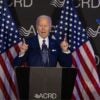Well, it’s about time. The Justice Department finally has obtained a serious indictment against Hunter Biden, one that charges him with nine felony and misdemeanor violations of federal tax law.
Noticeably absent from the salacious, 56-page indictment issued Thursday evening are any charges related to the failure of President Joe Biden’s son to register as a foreign agent under the Foreign Agents Registration Act, known as FARA.
But this indictment came about for three reasons:
The Daily Signal depends on the support of readers like you. Donate now
First, because brave IRS whistleblowers testified under oath, at great expense to their careers, that the government was going easy on Hunter Biden.
Second, because an earlier sweetheart deal fell apart when a federal judge uncovered DOJ’s shady plea agreement with Hunter.
And third, because ongoing congressional oversight and public outrage pressured DOJ to get to the bottom of this sordid affair.
The titillating indictment was filed in federal court in Los Angeles, where Hunter Biden, 53, is a resident despite his forays and stays at the White House and his father’s home at Rehoboth Beach in Delaware. The indictment illustrates not only the tawdry, sordid lifestyle of the president’s son, but his indifference to his obligations to pay income taxes and his intentional lying about business expenses.
The indictment alleges that the younger Biden “engaged in a four-year scheme to not pay at least $1.4 million” in federal taxes owed for 2016 through 2019, including filing “false returns” in 2020 for the 2018 tax year.
During that time, he received “more than $7 million in total gross income” to “fund his extravagant lifestyle,” a polite term for describing the money that Biden spent, according to the indictment, “on drugs, escorts and girlfriends, luxury hotels and rental properties, exotic cars, clothing, and other items of a personal nature, in short, everything but his own taxes.” The list includes a Porsche, a Lamborghini, and a “lavish house on a canal in Venice Beach.”
The lurid details in the indictment, some of which are taken directly from Biden’s memoir, “Beautiful Things,” were used by the Justice Department to show that he was fraudulently claiming business expenses for things such as paying an entourage of “thieves, junkies, petty dealers, over-the-hill strippers, con artists, and assorted hangers-on.” In 2018, when he supposedly was engaged in business affairs, Hunter Biden actually was using crack cocaine “twenty-four hours a day, smoking every fifteen minutes, seven days a week.”
There is really nothing new in the indictment that hasn’t been previously disclosed. It’s just that DOJ finally has done what it should have done years ago with the evidence prosecutors developed then.
But here’s the rub. If the Justice Department had indicted Hunter years ago, there would have been more felony charges because of his failure to pay taxes in 2014 and 2015 (at a time when he was earning money by selling access to his father, who was then the sitting vice president).
Which leads a normal person to ask: Why did DOJ allow the statute of limitations to expire for those years? Could it be that politicos there didn’t want to bring further scrutiny to any connections between Hunter and his daddy?
The indictment alleges that the younger Biden violated provisions of law (26 U.S.C. §§ 7201, 7203, and 7206) against evading a tax assessment, failing to file and pay taxes, and filing a false or fraudulent tax return. Two statutes are felonies that subject a criminal defendant to up to five years in prison and a maximum $100,000 fine, while the third is a misdemeanor that could lead to one year in prison and a maximum fine of $25,000.
What is missing from this indictment are any charges under the Foreign Agents Registration Act, which requires individuals who engage in political activities on behalf of foreign entities, including influencing government officials and policies, to register with the Justice Department.
Hunter Biden was selling only one thing for the millions of dollars he was being paid in China, Russia, Ukraine, and other foreign nations—the Biden brand. He monetized the brand.
There is a plausible, if not strong, argument that FARA applies to him because of the myriad “business” activities he was engaged in overseas. The indictment outlines the foreign entities he was representing, including a “Ukrainian industrial conglomerate [Burisma Holdings] and a Chinese private equity fund [CEFC China Energy Co. Ltd.].”
Is DOJ going to allow the statute of limitations to lapse on these charges, too? Or is special counsel David Weiss going to seek a indictment under FARA in another federal district?
This indictment certainly will influence Hunter Biden’s congressional testimony, set for next Wednesday. He has refused a closed-door deposition by the House Oversight and Reform Committee and demanded a public hearing.
The president’s son no doubt wanted a public spectacle where he could defend his father and embarrass the committee by giving speeches expressing outrage at the panel’s investigation. That’s something he couldn’t do effectively during a nonpublic deposition in which he would be cross-examined, Perry Mason-style, over false or evasive answers.
Now, if Hunter Biden is compelled to appear before the House committee, he likely will invoke his Fifth Amendment right against self-incrimination.
Given the facts alleged in this indictment, no one would want to be questioned, under oath, for this conduct. Furthermore, the president’s son certainly would refuse to answer questions about payments, loans, or monies he gave to others, especially his father.
The kid-gloves treatment that the younger Biden has received over the past several years has engrained a belief among Americans that receiving justice depends on who you are in the political world.
This indictment is a first step in providing a full reckoning for Hunter Biden’s criminal misconduct. But it will take a lot more than indicting the president’s son for obvious tax fraud to erase that idea that we have a rigged system of justice in this country.
Have an opinion about this article? To sound off, please email letters@DailySignal.com, and we’ll consider publishing your edited remarks in our regular “We Hear You” feature. Remember to include the URL or headline of the article plus your name and town and/or state.































